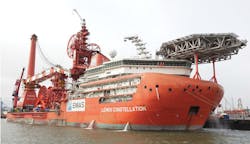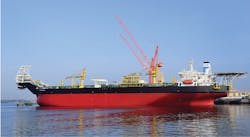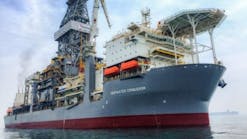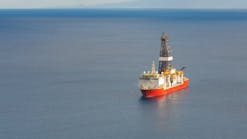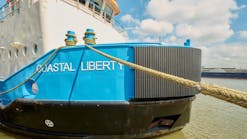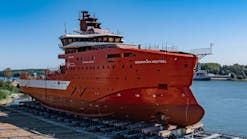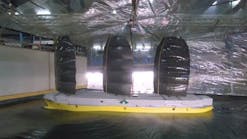Jessica Tippee Houston
Awilco commissions harsh environment semisub
Awilco Drilling has awarded Keppel FELS a $425-million contract to build a harsh environment semisubmersible drilling rig. The Moss Maritime-design CS60 ECO MW rig will be equipped and certified for drilling offshore Norway, including the Barents Sea, in water depths up to 5,000 ft (1,524 m).
Delivery is scheduled for late 1Q 2021.
Keppel FELS has also negotiated options to build up to three additional rigs of similar design for the same client over a period of up to three years.
Keppel FELS said the new rig would be a compact version of the ultra-deepwater CS60 design, configured and outfitted for mid-water depth operations.
Keppel O&M CEO Chris Ong said: “The use of real-time data in the rig’s operations and maintenance will enhance its efficiency and robustness, providing a competitive advantage for harsh environment operations. We will also incorporate Keppel O&M’s cost-effective engineering and construction solutions in this purpose-built rig.”
Features will include a hydraulic hoisting system with 2 million pounds of lifting capacity, an optimized 12-point, thruster-assisted mooring system for vessel station keeping, a hybrid power supply and energy-saving features.
There will also be a strong emphasis on digitalization, in, for instance, the condition monitoring systems, which should enhance drilling efficiency and reliability while reducing the likelihood of downtime, according to Keppel FELS.
Jon Oliver Bryce, CEO of Awilco Drilling, said: “We see growing activity in the harsh environment mid-water rig segment with utilization increasing, especially in the North Sea. This will be the third semi to join our fleet. With the options to order another three rigs, we are well positioned for the market recovery…
“The market has a clear preference for high specification rigs from a reliable shipyard like Keppel FELS.”
Saipem purchased theLewek Constellation for $275 million. (Courtesy EMAS Offshore)
Lewek Constellation gets new owner
Saipem has an agreement to acquire the deepwater multi-purpose construction vesselLewek Constellation, formerly owned by Ezra Holdings, for $275 million. Completed in 2013, the rigid/flex-lay, 3,000-ton heavy lift/construction vessel will be marketed in areas suited to its subsea tieback capabilities, including the Gulf of Mexico, the North and Norwegian seas.
Saipem CEO Stefano Cao said: “Subsea tieback developments are becoming increasingly important as they maximize the utilization of the existing infrastructures at reasonable expenditures.
“Saipem was only partially participating in this market. The acquisition of theConstellation bridges this gap, expanding the set of future opportunities. This acquisition is part of our strategy aimed at fostering Saipem Subsea growth and will additionally contribute to enhance stronger relationships with our partner in the integrated SURF and SPS segment and with the clients mostly active in this market.”
TheFSO Benchamas 2 will be deployed at the Chevron-operated Benchamas field in the Gulf of Thailand. (Courtesy MISC Berhad)
MISC completes FSO conversion for Chevron
MISC Berhad recently held a naming and delivery ceremony at the MMHE West Yard in Pasir Gudang, Johor, Malaysia, for theFSO Benchamas 2.
In August 2016, Chevron awarded MISC Offshore Floating Terminals Ltd. a lease and operations contract for the FSO. The project marks MISC’s maiden foray into Thailand’s offshore oil and gas industry as well as its first collaboration with Chevron in the offshore market.
The FSO will be deployed at the Chevron-operated Benchamas field in the Gulf of Thailand. It has a storage capacity of 650,000 bbl with a design life of 12 years without drydocking.
Conversion of the Aframax tankerBunga Kelena 5 to the FSO Benchamas 2 began in early 2017, and was completed as planned. MISC said that the project took more than 2.2 million man-hours to complete, with zero lost time injury.
ABS to class the Gulf of Mexico’s first hybrid-powered support vessel
SEACOR Marine has selected ABS to class the first offshore support vessel (OSV) in the Gulf of Mexico (GoM) to operate using hybrid power. The company requested the BATTERY-Li notation for theSEACOR Maya OSV, currently operated by Mantenimiento Express Maritimo SAPI de CV (MEXMAR), its joint venture in Mexico. The OSV is being upgraded to use lithium battery power. Modifications are expected to be completed next month.
Dr. Wei Huang, Director for Offshore Support Vessels, said: “ABS recognizes the economic and environmental benefits of hybrid-powered vessels to reduce fuel consumption and emissions in the marine and offshore industries. This milestone reinforces our safety mission and promotes development of alternative power applications and energy storage systems that optimize efficiencies.”
Tim Clerc, SEACOR Manager of Engineering, said: “The hybrid power solution on theSEACOR Maya has the potential to significantly reduce fuel consumption—by as much as 20%. Integrating new technologies is complex. To help SEACOR realize the benefit of using cutting-edge hybrid power, we partnered with ABS, to class the lithium battery system, to help validate its reliability. The operational savings gained from a hybrid power solution will also reduce emissions and facilitate our compliance to strict environmental regulations.”
The company also has engaged ABS to provide the optional BATTERY-Li notation on three additional OSVs operated by MEXMAR. The conversion to hybrid power for theSEACOR Azteca, SEACOR Warrior, and SEACOR Viking is expected to be completed in July 2018.


